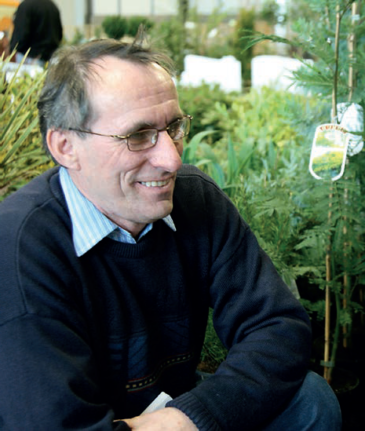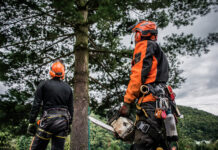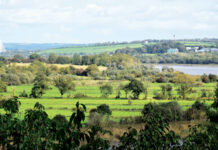Barry Lupton Interviews Philip Moreau
| I’m fascinated by passionate people. People who persevere, who ignore the naysayers and the begrudgers and overcome challenges in the pursuit of what they believe. Dynamic people with seemingly unending energy, determination, and enthusiasm. How could you not be fascinated by such people? They are the drivers of innovation and change.
Philip Moreau works in a garden centre in Limerick. He’s helping the owners develop the business. He also does some lecturing to year four horticulture students in Limerick University and is currently considering a variety of exciting future options for his career. I first interviewed Philip Moreau over a decade ago for Horticulture and Landscape Ireland. I was finding my feet at the time and seeking out people of passion and knowledge to help shape my understanding of the sector. I was directed to speak to Philip. He didn’t let me down. In fact, he had such an impact on me that when Horticulture Connected was launched, he was the first person I turned to for a second interview. He was the only person I ever interviewed twice. When I heard of Glenbrook’s closing I was saddened but also cautiously hopeful. Having had several opportunities to speak with Philip over the years I knew the closing of the business must surely be the start of something new. Despite me hassling him over the year I was delighted that he agreed to speak with me once again, but some context first. Philip has been involved in the production and sale of plants since his early teens. Having made a profit selling off his first crop – the seeds being purchased with his pocket money and cultivated in the back garden of his family home – he was hooked. After graduating from the National Botanic Gardens, he moved to Cork where he maintained a four-acre garden, producing vegetables for several local hotels. Although he had grand plans for an African adventure, a number of things conspired to keep him in Ireland. After a short and unsuccessful move to Waterford, he returned to Cork to work for the County Council but was soon offered a position of nursery manager at McLysaghts, where he spent the next 11 years. With the help of his friend and neighbour, Paul Brooks, he established Glenbrook in 1990. |
While I want to understand the story behind Glenbrook’s closing, I’m genuinely more curious about what you have planned for the next Moreau chapter. Can you let us in on your plans?
At this point in time, I have not really come up with a plan for the future. However, I am involved in the running of Busy Bee Garden Centre on the Ennis Road, Limerick. There is a great deal of work necessary to bring it up to standard and we are putting up a covered area in the back and refurbishing the display area. This task will take me through the winter and into spring. From there I have no great plans, a few ideas but nothing concrete. I must say working in the garden centre has given me a great insight into the other part of the industry. It is amazing how the public has very much their own individual demands in terms of plants, pots, accessories etc. It is a very difficult task to cater for and stock the right items for sale. What you like may not be pleasing to the customer. One aspect I really enjoy is giving advice and talking about the plants, their origins, and general needs. The banter one can have with the customers is great. Light-hearted chat is good for the heart.
You are known for being vocal and active on industry issues. Now that you are no longer consumed by your own business, how do you think your experience and knowledge can be put to work to address these problems?
That’s a very interesting question. I would think I will still be vocal should the occasion arise; however, knowledge is a different issue. Our industry has changed so dramatically over the past decade, not to speak of the 50 years I have spent in it, every aspect has changed so dramatically that in a very short space of time one is out of date. I continually read up on the scientific developments, political issues, marketing trends, and general horticultural opportunities. Only the other day I was wondering if the residue of the rapeseed oil industry might offer a cure for weevils. If you added the haulms to the substrate, the isothiocyanates in the residue might deter weevils. A paper was written on the control of weevil eggs using the chemical. Isothiocyanates are found in plants of the Cruciferae family (cabbage, sprouts, turnip, kale, mustard etc) and in mustard seed and rape used as a biofumigant. It will control nematodes in open ground and other pests so is it worth a try. I do think of very strange things. Thanks to Dr. Alan Hunter in UCD I have had the opportunity to give a few lectures to the 3rd and 4th-year students on nursery marketing and the principles of selling. I do enjoy teaching and I may seek work as a guest lecturer to horticulture students in the colleges if required.
Why did Glenbrook go into receivership?
It all started in the bad year of 2009-2010. We lost €750,000 in stock that year and from then on it was a struggle. We put more personal monies, bank finance, and family funds into the business, but we could not pull it around and debt built up. In the end, we went for voluntary liquidation as the banks had closed our accounts and called in their loans. The following year 2011 the spring was very wet and miserable and our biggest customer canceled their Easter allocation, which again left us with €100,000 of prepared stock on the ground. They did take it eventually but at discounted prices, giving us the option of either dumping it or accept lower prices with the stock being put on sale. For cash flow purposes it was better to accept the lower prices and bear the loss rather than totally writing it off. A colleague of mine said, “Philip, a nursery does not die. It withers away slowly”. Well, it took seven years to wither away until all life was lost. But my wife and I still have our health, DG.
Can you take us through the lead up to the winter of 2009 (general operating conditions/business etc)?
These were the halcyon days of Glenbrook Nurseries. The nursery was packed with stock, 75% sold. In the early 2000s we had built up a very good business both in Ireland and the UK, and 2010 was to be our best year. We were projecting sales of over €2m and the great pity was, the frosted plants were all sold with an allocation going to Wyevale and Dobbies the first week of the year for putting on shelves in week 4. At that time of year, there would be very little business in Ireland so it was great to have the UK business. We have to remember at that time we were in a very bad recession and the building industry on which we relied for winter business was almost at a standstill. There was just no planting either before Christmas or after. We had reduced staff over the winter months with the demise of the Celtic Tiger but we were still paying out €500,000-€600,000+ on wages for 25 staff. It was a very big contribution to the local economy as jobs were scarce with emigration and the recession.
What action did you take following the decimation of your stock holding?
Apart from the stench of ethereal gas in the glasshouse one might not have been able to recognise the devastation. The tops above ground looked good but when one examined the roots and lower stems the damage was plain to see. Of course, we were not the only nursery hit. Most badly damaged did not get snow cover so the -17°C was deeply felt by the plants. That temperature was inside in the glasshouse; it was like a deep freezer. It just got colder and colder. Anyway we, the affected nurseries, clubbed together and sought adverse weather compensation from the Department of Agriculture, which was blankly refused to the nursery stock industry although it was given to potato and vegetable growers. This was, of course, very discriminatory of the government of the day. Both Fianna Fail and Fine Gael turned their backs on us all. It was a disgrace and I must say that was the biggest let down of my career.
Adverse weather compensation is an EU emergency package, which gives member states the authority to compensate the agricultural sector in times of destruction of crops by adverse weather, whether that is for farmers or horticultural crops, and has been done in many EU countries, especially Italy, Lithuania, the Netherlands, Belgium, and Finland. The group tried and I tried to get some hearing but to no avail. The Minister of Agriculture Simon Coveney and his predecessor Brendan Smith just did not want to know, nor did his private secretary. The comment passed was, “We were just trying to jump on the potato and veg bandwagon”. What an insult when you consider what these boys were earning themselves! Every year I raised the subject at the plenary session of An Bord Bia with Minister Coveney but it just fell on deaf ears and on my final plenary session I said nothing, and Simon joked on how he had not been questioned by the horticultural sector this year. Laugh.
We dumped the dead plants, which cost us as much as processing them for the market.
What was your experience of dealing with the banks?
At that time in 2010 we were capitalised enough to move on for a few years but as things got tighter, so did the banks. You know the adage about banks giving you the umbrella on a fine day but as soon as it rains they want it back. In hindsight, maybe we should have closed five years earlier.
What spurred you to close the doors for good?
Since January 2017 we have had several meetings with the bank. We had put the nursery up for sale as a going concern some time ago. I suppose I knew the writing was on the wall, however, they gave me six months to get our act together. But we failed and the rest is history. We went for voluntary liquidation instead of letting the bank put in a receiver who would just close the gate and throw away the key as they did with others in the industry.
I often think of the nursery sector as a family, competing, fractured and dysfunctional, but caring nonetheless. What was the reaction of your nursery colleagues when they heard you were in trouble?
I must say they were very supportive. The hardest day was when I went to GLAS in City West to face the industry, but everybody was great to me and that is what this industry is all about. We are all characters in a play, each playing their own part in supporting each other, and hoping for a full house for the benefit of our industry.
You had a small, but loyal and highly experienced team at Glenbrook. What are they doing now?
Sadly, they have gone their different ways. I had a great time for all our staff and we were one of the first to employ the eastern Europeans before they joined the EU. Without question, they were all very good, whether they came from Poland, Lithuania, Latvia, Belarus, Czechoslovakia or Ukrainian. Good to work with, they all had a great sense of humour. Many referred to me as their Irish father. What a nice compliment.
Our nursery was also a training nursery for the students from the Fachhochschule in Germany. We had students from Wiesbaden, Osnabruck, Weihenstephaner, The INRA Angers in France and the Hochschule in Austria. They brought great light, culture, and friendships which we still value to this day.
So what happens to the nursery now?
It is basically up for sale and the proceeds will pay the bank and Revenue if it is sold. Otherwise, I just do not know.
Looking back, what would you do differently?
Nothing. You cannot look back in anger, to quote the song. You know, Barry, even if the business was extremely successful what was I going to do with it? Neither of my children has any interest. They are both happy doing their own thing, so a closure was inevitable in the heel of the hunt – but maybe not this way. C’est la vie. That’s life.
There is one thing I would like to say; whatever job or career we chose in life, the office, tools, computers, premises etc. are just a way of making a living. These are the tools which we use to develop our careers and are the means to work, rear our families, pay our mortgages. They are all material goods which we use to achieve that goal, and then it is time to part company.
There are some things nursery owners can control, the weather is obviously not one of them. Having suffered the worst consequences of Irish weather, what advice would you give to the rest of the sector?
It is high time the industry in general including all primary sectors of horticulture forced the government into adverse weather compensation support. The farmers involved in the mainstream sectors (pigs, grain, cattle) get support, whether, for dioxin poisoning, weather-related fodder crises, foot, and mouth etc.
You’ve previously made some dark predictions about the Irish nursery sector; there won’t be one in 20 years and that if there is one, it’ll be more like that of the 1970s, with small, adaptable business with general offerings. What do you think now?
My views have not changed. On a general issue of multiples participation in selling plants, the wastage is incredible. I do not understand how they can carry such losses. Ireland may be heading for the Tiger’s back again in the larger population areas like Dublin, Cork, and Limerick but the housing is still in disarray. The smaller towns and areas have not come out of recession. Just look at the number of vacant premises in rural Ireland. No jobs, no housing, no money flowing around. I am involved in the Credit Union movement and I can say the average take-home pay of Joe Soap is about €450 a week. Therefore you need two wages per house to pay mortgages and rear children, and there is very little change left. One foreign holiday per annum sees the leisure euro eaten up.
From an international perspective, the garden centre chains are struggling. In my opinion, they have poor directors and top staff who just do not understand the gardening psyche. Wyevale Garden group produced a phenomenal loss yet again and had to be bailed out by private equity capital injection but what is changing? Nothing, just throwing good money after bad. We have to get back to basics where garden centres are local for the locals and have something else to offer apart from the restaurant, furniture, barbies etc. Back to plants, plants and more plants, gardening and good advice. Nurseries can go back to having a good range of material. I notice there are no water plant producers in the country or producers of maiden fruit trees or soft fruit bushes. I do not mean people selling Dutch – we can all do that. This change starts in the classroom of our colleges, especially the Teagasc colleges. Horticultural skills are lost forever.
What are the strengths of the Irish nursery sector which could be better exploited to build a more sustainable industry?
There is great knowledge out there at present within our industry but I worry about the next generation. The question I would ask is, “Is there a sustainable future in the industry when you see the customer only wants colour, colour, and colour?” A high percentage of my garden centre customers watch Monty Don on TV. There is an opening for a good gardening programme on RTE or the other channels. We need to educate the public on plants, the stories behind them, their countries of origin and the best way of getting the best from them.
I’ve always had the sense that government intervention in the sector has served to undermine development. Perhaps I am wrong, but I feel the sector fails to fully engage with new ideas because they do not fully own them. It’s simply too easy to walk away when someone else is taking responsibility. If government intervention and support are to continue what form should they take?
I do not really know. Going back to the winter of 2010 issue I believe Teagasc was reprimanded by central government for introducing the devastation report to the Department of Agriculture instead of working together. Looking at the different government bodies there seems to be a no joined-up thinking. There is very little connection between Teagasc, An Bord Bia, and central government and the industry. Symbiosis in the government sectors is non-existent, with everyone paddling their own canoe and minding their own job. Research is now very much determined by those who pay the most, whether in EU projects or private companies. We forget that the taxpayer is the biggest payer and the industry being in that sector it should be given a first call on what is needed by the industry. There is so much work which can be done like my two pet subjects Silica as a beneficial element and what about my isothiocyanates!! Who is looking at these issues?
Grants are alright if you have capital, but there is little help for starter nurseries and beginners.
If globalization were to continue on its current trajectory, what plant materials should we be growing and where should we be selling them?
We should reduce the carbon footprint and be more into import substitution. We still are promoting plants which just do not suit the Irish climate. I am as guilty as the next person for this misguidance. We have and had great plants which are colourful, easy and suit this climate which is gone out of favour.
Why? Because we are promoting plants from abroad which just hate Ireland.
What role do you think the nursery sector should play in protecting and enhancing the natural world?
Conservation is primary. I never thought I would admit that IPM and bio-cures are best. Keep it up and use more sustainable methods. I find the whole climate changing issue very interesting. The world has been changing, from the time we crawled out of the chemical sea to today. That is why we have had Devonian, Jurassic, Triassic, Cretaceous, and Carboniferous periods and ice ages. We’ve not been around long enough to really understand climate, despite what you might hear in the media.
Back in the day, tomato and other greenhouse crop growers used to give carbon enrichment by burning propane gas. This brought up the carbon dioxide from 300ppm to 3,000ppm and the plants grew better. I do not see a huge flourishing of growth in nature with all the extra carbon dioxide that is supposed to be present. But that’s a debate for another day.
Your experience doesn’t seem to have dampened your passion for nursery stock production. How do you keep so positive and what words do you have to inspire the next generation of growers?
Study, study, study, read, read, read. Treat every day as a learning day, and aim to be the best that you can.
You told me before that you don’t regret one day of your life. Does this still stand?
Absolutely. I may take up a new interest which was my second choice of career – geology and plant exploration. I would love to do a nature program dedicated to plants and pollinators. It is still a wondrous world. Any offers? ✽










